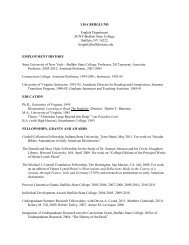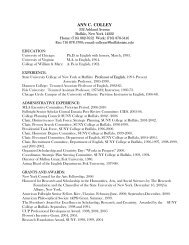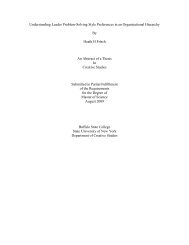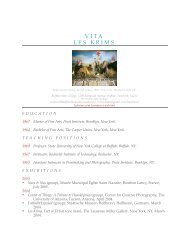POLITICS VERSUS SCIENCE: APPORTIONING ... - Buffalo State
POLITICS VERSUS SCIENCE: APPORTIONING ... - Buffalo State
POLITICS VERSUS SCIENCE: APPORTIONING ... - Buffalo State
Create successful ePaper yourself
Turn your PDF publications into a flip-book with our unique Google optimized e-Paper software.
1. Transfer of regulatory powers to an independent Authority could lead to an<br />
unwarranted dilution of democratic accountability<br />
2. The Commission must retain both regulation and control if it is to discharge the<br />
responsibilities placed upon it under the Treaties.<br />
3. An Authority with regulatory power could not be created under the current<br />
institutional arrangements of the EU, and would require modification of the existing<br />
provisions of the EC Treaty. 12<br />
This marked a significant shift from Santer’s speech before Parliament in the midst of<br />
the BSE inquiry when he said,<br />
I also think that an independent agency, to meet the specific needs of the Community<br />
but based on the positive aspects of the United <strong>State</strong>s Food and Drugs Administration,<br />
should be considered. Compliance with the principle of subsidiarity, to which we are all<br />
attached, must not be used as a pretext for obstructing the emergence of a credible<br />
European health protection system, as a necessary follow-on from the single market<br />
(European Parliament 1997).<br />
The Commission’s food safety proposal rested on its interpretation of which structure<br />
best satisfies democratic accountability: each of the three Commission arguments<br />
elaborated in the White Paper—democratic accountability and transparency;<br />
Commission control and management as the most effective protection for the consumer;<br />
12 The third assumption, that “an Authority with regulatory power could not be created under the<br />
current institutional arrangements of the EU, and would require modification of the existing provisions of<br />
the EC Treaty” is subject to interpretation. Weiler (1999, 343 & 344) in his review of the comitology<br />
system writes that:<br />
…the notorious Meroni doctrine is premised on the belief in the ability and the necessity of<br />
assigning and maintaining certain functions and powers to the sharply defined subjects. The<br />
Council may have discretionary power, a committee may not…The damage created by the<br />
constitutional insistence on instrumental boundaries is no less troubling. Since the boundary is<br />
untenable, one resorts to fiction, not to say deceit. The only question is whether the Court<br />
knowingly or unknowingly turns a blind eye to the fictions of both the Council and Commission<br />
when they apply their Meroni circumventions.<br />
Everson et al. (1997, 12) argue that, “neither Article 4 nor the Meroni doctrine are writ in stone,<br />
and it should no longer be simply assumed that they act as a legal bar to the evolution of European<br />
agencies…Meroni is likewise a product of the jurisprudence of its time and may updated in light of the<br />
advances in legal science and judicial thinking.” 12<br />
20












